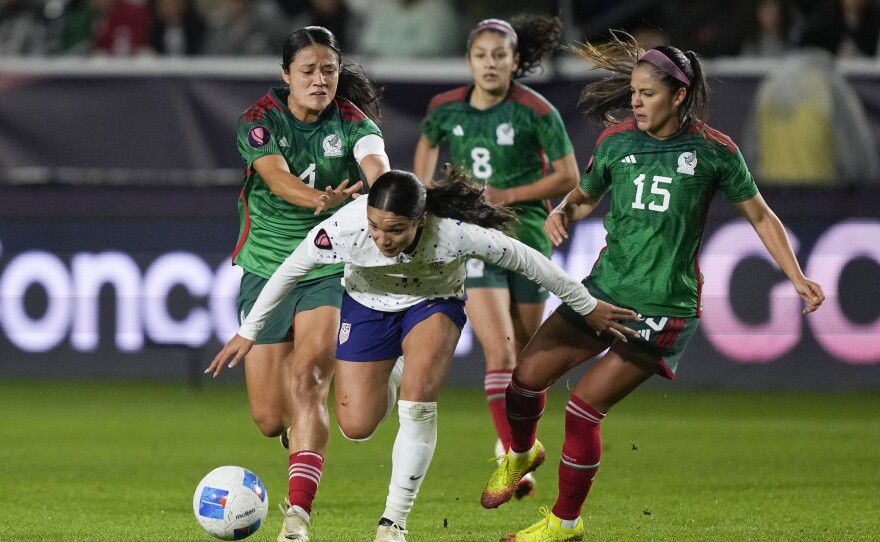The U.S. national team has fought for years to raise the level of women’s soccer across the globe, but that doesn't make its inevitable losses to teams it once dominated any easier.
"People say that everyone’s catching up with us. Of course, and that’s what needs to happen in women’s football,” forward Alex Morgan said after the U.S. fell 2-0 to Mexico on Monday night at the CONCACAF Women’s Gold Cup. "But yes, do we want to stay on top? Absolutely. But we have to continue to have an edge and today we didn’t have that.”
The loss was only the second time Mexico has beaten the U.S. The only other Mexico victory in the 43-game series was in 2010, a 2-1 win at a World Cup qualifying match in Cancun.
Coming as it did after some difficult times for the U.S. team, Monday's loss was inevitably going to raise questions.
"Ten, 15 years ago, was way different with the score lines than it is today. I think fans are seeing that all of the teams are continuing to improve and evolve and can compete at the highest level. If not tactically, it’s technically or it’s mentally or it’s physically,” Morgan said. “Teams are executing their game plan against top teams in the world and they’re simultaneously becoming better."
The United States won back-to-back Women's World Cups in 2015 and 2019. But as the women's game drew more attention, other federations invested in their teams, and professional leagues grew internationally. The U.S. women set an example by campaigning for equal pay to their male counterparts.
The United States went into the Tokyo Olympics hoping for a gold medal but was inconsistent and settled for a bronze.
The team also uncharacteristically lost three straight exhibition matches at the end of 2022, to England and Spain in Europe, and then to Germany in Florida.
But more than anything, the U.S. performance at the Women's World Cup last summer exposed the team's weaknesses. The Americans crashed out in the Round of 16, eliminated on penalties to Sweden. It was the earliest ever U.S. exit from a World Cup.
Morgan and defender Becky Sauerbrunn were both on that 2010 team that lost to Mexico. With the semifinal victory on a field normally used for baseball, Mexico secured a spot in the 2011 Women's World Cup. Mexico would go on to lose to Canada in the qualifying tournament's final, and the United States had to beat Italy in a two-legged playoff for its World Cup berth.
“I think now you’re seeing just the results of players being invested in, and playing year-round, and having the resources like the men have always had. So of course, you’re going to see just the competition continue to elevate on the international level,” Morgan said.
Despite Monday's loss, the United States advanced out of its group at the Gold Cup, and the team can still lift the tournament trophy. That means they must quickly rebound for the quarterfinals.
The top two teams from each of the three groups, as well as the top two third-place finishers, advance to the Gold Cup quarterfinals, which begin Saturday. The U.S. players don't yet know their opponent.
On Monday night, the United States appeared stunned following Lizbeth Ovalle's goal in the 28th minute that put Mexico in front. Ovalle, who plays for Tigres of Monterrey, got past Sauerbrunn and floated her shot over goalkeeper Alyssa Naeher and two defenders into the net.
It was the first goal conceded by the United States to a CONCACAF opponent in 33 matches.
Mayra Pelayo added another goal for Mexico from distance in stoppage time. As the players celebrated their victory wildly on the field, the large crowd of Mexico's fans danced in the stands.
The loss was the first for the U.S. under interim coach Twila Kilgore, who assumed the team following the World Cup exit. Chelsea's Emma Hayes will take over for Kilgore in May after the Women's Super League season concludes.
“I think it just shows how far the game is coming and there’s no easy games anymore. And if we don’t take care of business and we don’t execute, this is to be expected,” Kilgore said. “We’ll step up and take ownership in that and I think anytime you have a group that is willing to take ownership in things like this, it’s a good thing for the future of the tournament. Everything’s still on the table and we’ll be motivated, that’s for sure.”
Sauerbrunn was optimistic, saying that sometimes adversity is necessary for growth.
“You would love to win every single game that you play but unfortunately, the losses you do learn a lot about the team, about yourself,” she said. "We’re not going to forget this one. It’s gonna live on. It’s a tough pill to swallow but sometimes you get the best results from learning from it.”






